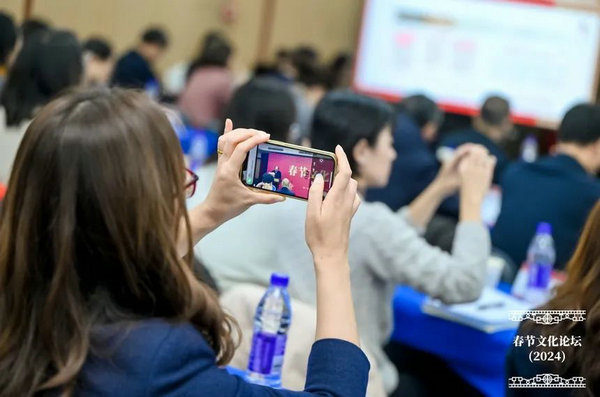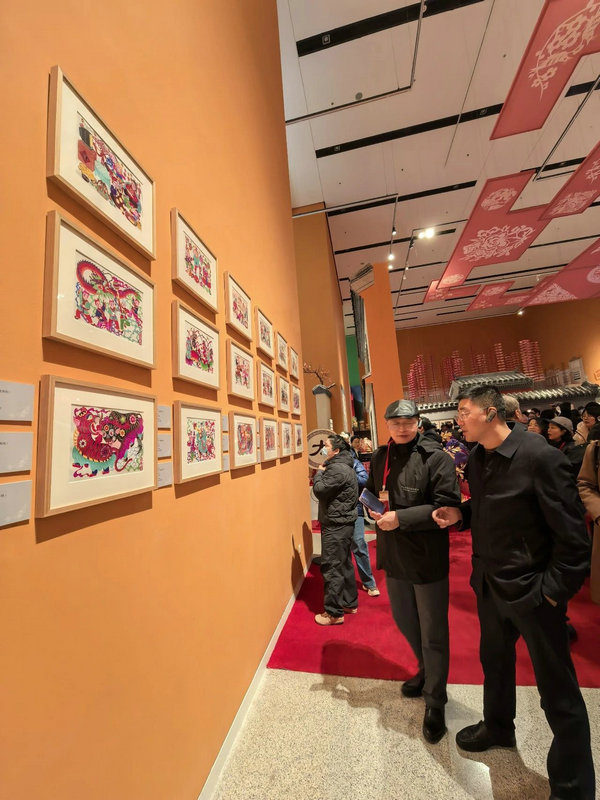


Experts gather and discuss Spring Festival culture in Beijing
Chinese people often say: "Winter Solstice is the prelude to a new year". Serendipitous as it is, the 2024 Spring Festival Culture Forum was held on Dec 21, the day which Winter Solstice fell in 2024, where scholars and guests gathered to discuss the Spring Festival.

2024 Spring Festival Culture Forum was held on Dec 21 in Beijing. [Photo provided to chinadaily.com.cn]
Earlier this month, the United Nations Educational, Scientific and Cultural Organization (UNESCO) inscribed Spring Festival, the social practice of Chinese people in celebration of the traditional new year, on the Representative List of the Intangible Cultural Heritage of Humanity. The decision was made during the 19th session of the Intergovernmental Committee for the Safeguarding of the Intangible Cultural Heritage, taking place in Paraguay from Dec 2 to 7.
"The successful inclusion of the Spring Festival in the Representative List of the Intangible Cultural Heritage of Humanity marks its expansion from a national festival to a universal one. This great Chinese cultural heritage will shine even more brightly on the world stage," said Feng Jicai, Director of the Feng Jicai Institute of Literature and Art at Tianjin University, in his congratulatory message at the forum.
Kang Zhen, Vice President of Beijing Normal University, expressed that BNU has made numerous efforts in the preservation and inheritance of Spring Festival culture. Folklorists from the School of Sociology and the School of Chinese Language and Literature have directly participated in tasks such as the demonstration and text review for the inscription application. He hoped that this forum could serve as a platform for experts, scholars and practitioners in the field of Spring Festival culture to learn from each other and engage in mutual exchanges, further promoting the theoretical development and practical exploration of Spring Festival cultural inheritance.
Kang also believes that it is key to help foreign friends understand and appreciate Chinese values, worldviews and outlooks on life. "The Spring Festival emphasizes seeking overall happiness and joy based on respectful and orderly interpersonal exchanges and widespread harmony," Kang said.
Liu Kuili, Honorary Member of the Academic Division of the Chinese Academy of Social Sciences and Honorary President of the Chinese Folklore Society, pointed out that the Spring Festival is one of the symbols of Chinese civilization, the most distinctive cultural activity of the Chinese people, and a hallmark of cultural, national and state identity for the Chinese. "Celebrating the New Year is our cultural tradition. It signifies renewal for individuals, reconstruction of living environments and restructuring of social relations. It not only promotes harmony and unity within families and society but also builds a bridge for cultural exchanges and mutual learning between the Chinese nation and countries around the world," said Liu.
The successful application for the inscription of the Spring Festival on the UNESCO Representative List of the Intangible Cultural Heritage of Humanity was an arduous journey and the result of concerted efforts from all parties involved. Rong Shuqin, Secretary of the Party Branch, Vice Chairman, and Secretary-General of the China Folk Literature and Art Association, stated that the application process reflected the collaborative efforts and broad participation of government organizations, professional institutions, social organizations and universities, marked by experts and scholars such as Feng Jicai and Liu Kuili.
Zhang Bo, Deputy Director of Research Base for Beijing Studies at Beijing Union University, delivered a speech on "The Origin, Early Forms, and Subsequent Impacts of the Spring Festival". She stated that the Spring Festival is not only a ceremony to celebrate agricultural harvests and bid farewell to the old year and welcome the new, but also a crucial juncture for governing the country and establishing order. It holds significant importance for the formation and consolidation of the diverse yet unified structure of the Chinese nation.
Xiao Fang, professor and Director of the Department of Anthropology and Folklore at the School of Sociology, Beijing Normal University, presided over the keynote speeches. He praised the speakers for their exploration of theoretical experiences and future of the inheritance and dissemination of Spring Festival culture from various perspectives, including time systems, the spirit of public conventions, the application process for UNESCO inscription, historical origins and technological empowerment.
The 2024 Spring Festival Culture Forum was jointly hosted by Beijing Normal University and the Chinese Traditional Culture Museum, with the theme of "Preservation and Inheritance of Spring Festival Culture in the Process of China's Modernization". The two-day forum featured four sub-forums on "Theories on the Preservation and Inheritance of the Spring Festival", "Practices in the Inheritance of the Spring Festival", "Communication Systems for Spring Festival Culture" and "Innovation in Spring Festival Cultural Products".
On Dec 22, participants visited the China Intangible Cultural Heritage Museum of CTCM and engaged in discussions and exchanges centered around the "Celebrating the New Year - Spring Festival Theme Exhibition".

Forum participants visited the China Intangible Cultural Heritage Museum of Chinese Traditional Culture Museum on Dec 22. [Photo provided to chinadaily.com.cn]
Editor:Yu Hui
Copyright©2023 CSSN All Rights Reserved